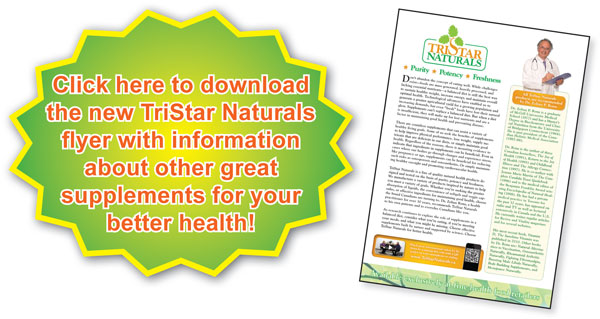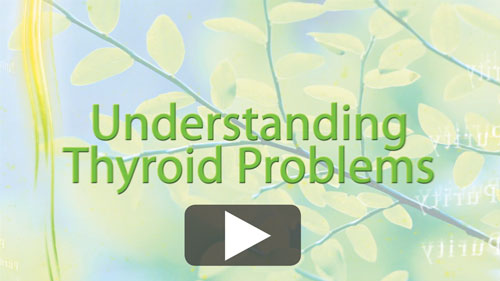Please click the image below to watch Dr. Rona's thyroid video
|
Secrets of Optimizing Thyroid Health
By Dr. Zoltan P. Rona, M.D., M.Sc.
The thyroid gland is a butterfly shaped gland situated in the neck wrapped around the windpipe located just below the Adam's apple. It controls metabolism and virtually every aspect of health including weight, mood, energy and circulation. Damage to the thyroid can lead to underactivity (hypothyroidism), overactivity (hyperthyroidism), thyroid inflammation (thyroiditis) and thyroid cancer.
The thyroid uses iodine and the amino acid tyrosine to manufacture the thyroid hormones T3 (triiodotyrosine) and T4 (thyroxine). About 80% of the hormones made are T4 while 20% is T3. It is T3 that is the more biologically active form of thyroid hormone. In order to have adequate amounts of T3 there has to be some conversion of T4 into T3. This is something that can occur both inside and outside of the thyroid.
The thyroid is controlled by a rather complex feedback mechanism. When the hypothalamus in the brain senses there is an inadequate amount of thyroid hormones present, it releases a hormone known as TRH (Thyrotropin-releasing hormone) which in turn tells the pituitary gland to release TSH which then stimulates the thyroid gland to synthesize and release more thyroid hormone (T3 and T4) into the circulation. Thus, the level of TSH goes higher in order to help the thyroid manufacture more of the hormones. The reverse occurs when there is an excess of thyroid hormone, a condition referred to as hyperthyroidism.
|
Causes of thyroid gland damage
- Radiation exposure - Think of the radiation catastrophe that has just occurred due to the Japan earthquake of March 2011. The thyroid is quite vulnerable to radiation. You do not have to be a victim of any radiation disaster to get thyroid damage. CT scans, x-rays and nuclear medical tests are more common ways people damage their thyroids. One especially unfortunate decision in the 1950s had dermatologists treat acne in teenagers with x-rays. As a direct result of this, thousands developed thyroid damage leading to various cancers. Let's also not forget the numerous types of radiation therapies for different types of cancer that end up destroying the thyroid.
- Overconsumption of soy - Despite a great deal of evidence that soy products are a health benefit in terms of cancer prevention, too much consumption can tip the balance in favor of boosting estrogen function. High estrogen activity weakens the thyroid. The advice here would be to restrict soy to one serving a day and stay with cultured soy products only (tofu, miso, tempeh, soy milk).
- High doses of lithium - In high doses (1200 mg daily) lithium is one of the treatments used by psychiatrists for bipolar disorder. These very high doses of lithium can cause hypothyroidism. Clever doctors of Complementary and Alternative Medicine have used this side effect of high dose lithium to reverse an overactive thyroid (hyperthyroidism). Lithium, in low doses (10 - 20 mg daily) is effective as a memory booster in older adults.
- Amiodarone - This is a drug often prescribed for abnormal heart rhythms. Unfortunately, it can damage the thyroid.
- Iodine deficiency or iodine excess - Iodine deficiency is probably one of the most common nutritional deficiencies. Too much or too little iodine can damage the thyroid. The World Health Organization in 1990 estimated that 28.9% of the population was iodine deficient. Severe deficiency of iodine produces a large lump in the neck known as a goiter. It can also produce mental retardation, impaired mental function and hypothyroidism. Excessive iodine has been documented to result in thyroiditis, goiter, hypothyroidism, hyperthyroidism and acne. Intakes of 1000 mg/day are probably safe for the majority of the population but with iodine, we must respect biochemical individuality to be safe. Even those who use large amounts of kelp or dulse will very rarely develop a problem with iodine side effects. There are some very sensitive individuals who will develop adverse skin and thyroid reactions to even a few milligrams of iodine. Fortunately, this is very rare.
- Thyroid toxic foods - The overconsumption of uncooked "goitrogenic" foods can weaken thyroid function and these include broccoli, Brussels sprouts, rutabaga, turnips, cauliflower, kohlrabi, radishes, cabbage, kale and millet. These foods, very much like soy products, are non-toxic to the thyroid in moderate amounts. It's only when one consumes these foods in large quantities that thyroid function is weakened. This, in itself, is an aspect of biochemical individuality.
- Other thyroid toxins - Tobacco smoke, perchlorate, fluoride, fungal (candida) infestations, toxic heavy metals like mercury and lead and a high sugar intake have also been reported to damage the thyroid. Once again this may be true for only some people and is not a generalized phenomenon.
- Stress - This is a frequently overlooked cause of thyroid damage but is certainly one of the causes of suboptimal thyroid function.
It is conservatively estimated that at least 60 million people in North America have some form of thyroid dysfunction. At least 10% of these people go undiagnosed. There remains a great deal of disagreement about making the diagnosis of thyroid disease between glandular specialists (endocrinologists) and natural health care practitioners.
Conventional endocrinologists are a rather dogmatic bunch when it comes to thyroid health. Most follow strict guidelines in making a diagnosis of hypothyroidism (underactive thyroid) and tend to dismiss symptoms that suggest the disease may be present when lab tests are not abnormal enough for them to treat the disorder. They are also quite adamant about the prescription of synthetic chemicals to correct the condition and are generally of the belief that natural solutions are useless or potentially dangerous.
|
Hypothyroidism
When the thyroid gland has become damaged and fails to produce adequate amounts of thyroid hormone, the TSH levels will remain high. If the TSH blood test is above 2.0 there is a strong chance that your thyroid is underactive. The normal range for the TSH is 0.4 - 2.0 but this is an area of controversy with the conventional medical forces saying that the upper limit should be 5.0.
There are a large number of symptoms that could make you think that you have an underactive thyroid. You do not have to have all these symptoms to be diagnosed as being hypothyroid but the majority will have several of these symptoms if their thyroid is not in optimal health. Combined with a high TSH a trial therapy for hypothyroidism is warranted.
|
Symptoms
- Fatigue - If you feel exhausted and weak despite getting 8 - 10 hours of sleep you may well have an underactive thyroid.
- Weight gain - If you have been on a low calorie diet, exercise daily and have eliminated all possible food allergies (especially gluten) yet you are still not losing weight, chances are high that your thyroid function needs help. There may be swelling in the eyes, face, arms or legs.
- Low body temperatures - If your body temperatures on average are below 97.4 F, chances are you are lacking an adequate supply of thyroid hormone. People who have hypothyroidism often feel cold in normal temperature rooms. They also do not tolerate cold temperatures (cold intolerance) as well as their normal thyroid function friends.
- Depression and anxiety - When there is no apparent cause for depression, anxiety, irritability, short-term memory loss, panic attacks and insomnia, there is a strong chance that hypothyroidism could be involved. This is not to say that all mental health issues are related to a low thyroid activity but that it is a commonly overlooked reason for suboptimal mental function. The common practice is to drug these symptoms with anti-depressants. Unfortunately, this does not correct the thyroid deficiency.
- High cholesterol - When a high blood level of cholesterol does not respond to diet, exercise or cholesterol lowering supplements, hypothyroidism may well be the cause. A high cholesterol reading combined with fatigue and obesity is almost always due to an underactive thyroid. Even in the face of normal blood levels of TSH (Thyroid Stimulating Hormone), a trial therapy to reverse low thyroid function should be attempted.
- Infertility and menstrual abnormalities - Infertility is quite a common symptom of hypothyroidism. In my practice I have seen at least a dozen cases of successful pregnancies after treatment was started with natural thyroid hormone even though the thyroid blood tests were quite normal. In the majority of cases, the TSH was normal and the patient was assumed to have normal thyroid function. Quite commonly, a low libido and menstrual difficulties (pain, excessive bleeding and cramping) are associated with a previously unsuspected case of hypothyroidism.
- Constipation - If you drink plenty of water and consume lots of fiber and still need to resort to laxatives to get regular bowel movements, consider a low thyroid condition as a potential cause.
- Hair Loss - This is a common symptom of hypothyroidism and is particularly distressing to women who reach the menopausal years. Hair can become brittle, coarse and dry, breaking or falling out easily. Although hair loss is often blamed on low estrogen levels, a more common finding is hypothyroidism. Look for an unusual loss of hair in the outer edge of the eyebrows. This is a common manifestation of hypothyroidism.
- Dry skin - Fragile and thin skin that does not respond well to moisturizers or vitamin E creams is not necessarily a sign of normal aging but may be an indicator that your thyroid is not functioning well. Cold hands and feet are sometimes also connected to a low thyroid.
- Carpal tunnel problems - This is a painful wrist condition that is under-recognized as being associated with a low thyroid condition. Hypothyroidism could also be the unexpected cause of chronic tendonitis and joint pain virtually anywhere in the body. Muscle cramps and frequent muscle aches and pains are not always a sign of exotic problems like Fibromyalgia but could simply be due to a low thyroid.
- Neck swelling or discomfort - A thyroid gland enlarges in a futile effort to make more thyroid hormone. As a result of this gland enlargement (a.k.a. goiter), one can have a sensation that there is swelling in the neck and develop some pain or hoarseness due to this.
- Family history - It is quite common to see a low thyroid condition in family members of those who suffer from hypothyroidism. Although it is not a given, there is a strong chance you will develop the condition if your mother or father was diagnosed with a low thyroid.
|
Treating Hypothyroidism
There are various levels of treatment for an underactive thyroid gland. It all depends on severity of symptoms, the blood levels of TSH, T3, T4 and the thyroid antibodies. Body temperatures are also a crucial factor in the treatment protocol. Sorting all this out is a fairly complex issue and is best dealt with the help of a natural health care practitioner.
|
For mild cases:
These are cases where the TSH is greater than 2.0, underarm body temperatures are on average below 97.4 F and where there are one or more of the signs and symptoms of an underactive thyroid present (e.g. fatigue, weight gain, high cholesterol, etc.). A combination of the following supplements will often help return the thyroid function to a more optimal level:
L-tyrosine - 1000 - 3000 mg daily - the body will use this amino acid to manufacture more thyroid hormone. Often, this amino acid is used as a treatment for fatigue or mild depression.
Zinc citrate or picolinate - 50 mg daily. Zinc and copper are both needed in the control of thyroid hormone production.
Copper citrate - 4 mg daily. The ideal zinc to copper ratio in the body is approximately 8:1 (zinc:copper).
Selenium - 200 mcg daily is required to help convert T4 (inactive) to T3 (active) thyroid hormone. Selenium is also important to prevent the formation of abnormal antibodies that can attack the thyroid leading to disease.
Vitamin D - 10,000 IU daily. Vitamin D has been linked to both hypothyroidism and hyperthyroidism. Blood levels of 25-hydroxy vitamin D should be done prior to supplementation.
Iodine as potassium iodide - 1 - 10 mg daily. Iodine is part of active thyroid hormone. The use of iodine is often strongly criticized by endocrinologists as potentially dangerous. Studies, however, have proven that most people can easily tolerate doses as high as 1000 mgs a day without any harm.
Homeopathic thyroid - 5 - 10 drops twice daily. There are reports that homeopathic thyroid is effective at reversing many of the signs and symptoms of an underactive thyroid. It may be a worthwhile product to try for those homeopathically inclined.
If 6 weeks or more of this supplement regime fails to do much for any of the signs and symptoms, a trial therapy with natural desiccated thyroid (30 mg twice daily) is recommended. Lab tests and symptoms should be monitored and dosages adjusted accordingly. I must point out that this is a type of treatment that is vehemently opposed by conventional endocrinologists who insist that desiccated thyroid is unacceptable because it fails to maintain stable thyroid hormone blood levels.
Endocrinologists believe that synthetic thyroid hormone (Synthroid, Eltroxin, L-throxine) is the correct treatment. Unfortunately, while synthetic thyroid hormone may return blood levels of T3 and T4 to normal, it does not always help the hypothyroid symptoms as well as desiccated thyroid. This remains an area of great debate between natural health care practitioners and endocrinologists. Personally, I prefer to treat the patient and not the blood tests.
In mild cases, the use of homeopathy or the supplementation of the amino acid L-tyrosine, zinc, copper, selenium and iodine combined with a sugar-free, caffeine-free diet can be used. Dosages of these nutrients depend on various biochemical tests as well as trial and error. For some cases, this may not be effective and actual thyroid hormone may be required.
The preferred thyroid hormone treatment is desiccated thyroid, which seems to be effective for at least 80% of the cases. For some this will not work and their thyroid can only be regulated by a pure T4 prescription (L-thyroxine). See a natural health care practitioner to get personalized therapy.
|
For moderate to severe cases:
These are cases where natural thyroid boosting supplements have been tried for at least 6 weeks and no benefits have been seen. Usually the TSH is above 5.0 and there may even be a swelling in the thyroid gland area. In such cases, one could certainly use desiccated thyroid starting at 30 mgs twice daily and monitor the hormone blood levels. In cases that are poorly controlled by the natural thyroid extract, the use of synthetic thyroid hormone may be needed. In my experience, this may only be true for about 10% of individuals diagnosed with hypothyroidism.
Many people have also read about the Wilson's Syndrome protocol for an underactive thyroid. To call Wilson Syndrome's therapy controversial would be an understatement. This treatment is so complex that a book and therapeutic manual have been written to help patients do the therapy correctly. It involves the scrupulous monitoring of body temperatures several times daily and the use of time released capsules of T3 (active thyroid hormone). One basically uses increasing doses of T3 to raise the body temperatures and adjusts dosages accordingly. For more information on this protocol see wilsonssyndrome.com.
Moderate or severe cases of hypothyroidism are best treated by a family physician. It's usually a good idea to get an ultrasound done in order to rule out more serious thyroid conditions such as thyroid cancer. Most family doctors will refer their more difficult cases to an endocrinologist for further assessment and treatment.
|
Other Thyroid Disorders
Although not as common as hypothyroidism, these conditions are often misdiagnosed and treated as if the issue were really one of anxiety, stress or some other mental illness requiring tranquilizers or anti-depressants as opposed to a real physical illness.
|
Hyperthyroidism (Overactive Thyroid Disease)
Hyperthyroidism (a.k.a. thyrotoxicosis or Grave's disease) is a condition whereby the thyroid gland produces too much hormone. It is most commonly seen in women between the ages of 20 and 40. The cause is unknown but often associated with severe stress. It produces a hyper metabolic state, which may be associated with a few or more of the following signs and symptoms:
- Goiter (enlargement of the thyroid gland); a goiter may also be associated with iodine deficiency and a low thyroid condition. Lab tests help to sort this out.
- Rapid heart rate (tachycardia) and palpitations.
- Warm, fine, moist skin; nail problems;
thinning hair.
- Tremor.
- Heart beat irregularities and high blood pressure.
- Nervousness, tremors and hyperactivity.
|
- Increased perspiration; heat intolerance.
- Weight loss often similar to that occurring in systemic cancer.
- Diarrhea and increased appetite.
- Insomnia; fatigue; weakness.
- Increased bowel movements.
- Exophthalmos (protruding eyeballs); blurred and double vision.
- Myopathy (muscle pain and weakness).
|
Prognosis with conventional medical treatments is generally very good but variable from person to person. Conventional treatments include anti-thyroid drugs such as Tapazole, radioactive iodine, and surgery. Beta-blocker drugs may be required to prevent heart beat irregularities and high blood pressure in the more severe cases.
Natural treatments can often reduce or eliminate the need for drugs and surgery. This is especially true if the disease is in its early stages. The mineral lithium can suppress thyroid function almost as well as prescription anti-thyroid drugs with fewer side effects. Like calcium or zinc, lithium is a mineral. It is most often associated with the treatment of bipolar disease (manic depressive disease) but in these cases the dosages used are very high (1200 mg daily) and there are side effects that can adversely affect the kidneys.
In hyperthyroidism, the lithium dosages used are in the neighborhood of 10 - 100 mg daily. One of the side effects of high dose lithium therapy, usually prescribed for bipolar illness, is hypothyroidism. The doses used for suppression of the thyroid gland are much less than those used in bipolar disorder and far less toxic. Toxicity of lithium can be curtailed by the use of omega-3 fatty acids, such as the ones found in fish and seafood. If you want to avoid eating fish because of their high mercury content, you can supplement with about 4000 mg of omega-3 oil capsules.
High doses of essential fatty acids (evening primrose oil, fish oils and flax seed oil) and mega doses of vitamin E (3000 IU or more daily) are also usually effective at cooling off an overactive thyroid gland.
Many foods help suppress thyroid function naturally and may be wise to increase in the diet of anyone suffering from a hyperthyroid state. These include broccoli, Brussels sprouts, cabbage, cauliflower, kale, mustard greens, peaches, pears, rutabagas, soybeans, spinach and turnips.
|
Hashimoto's Disease
Hashimoto's Disease can be quite confusing for many people to comprehend. It is a type of autoimmune inflammatory disease of the thyroid gland in which the immune system makes antibodies that attack proteins in the thyroid gland causing gradual destruction of the thyroid gland itself leading to eventual hypothyroidism (underactive thyroid function).
Hashimoto's belongs to the same category of diseases as celiac disease, lupus, rheumatoid arthritis, myasthenia gravis, scleroderma and ulcerative colitis.
In Hashimoto's there could be a goiter and high levels of antibodies against thyroglobulin (TG) and thyroid peroxidase (TPO). A fine needle biopsy of the gland will show large numbers of white blood cells (lymphocytes and macrophages) and an ultrasound usually shows an enlarged thyroid gland.
People with Hashimoto's have variable symptoms. Some do not complain of any problems but many will feel a neck enlargement with discomfort or pain. In severe cases, swallowing or breathing can become difficult and occasionally require surgery. Thyroid hormone production may periodically become excessive, producing some of the symptoms of an overactive thyroid. Hormone levels may cycle between very high and very low levels, eventually settling into hypothyroidism.
Common symptoms include anxiety, insomnia, fatigue, depression, hair loss, weight changes, muscle and joint aches and pains as well as fertility problems. In the case of a symptomatic goiter, most doctors will prescribe thyroid hormone (usually L-thyroxine). Conventional medical doctors and endocrinologists, however, will not treat Hashimoto's unless there is a goiter or the TSH is outside normal limits. Complementary and alternative practitioners will often treat the condition, depending on the symptoms, with low dose desiccated thyroid (natural thyroid hormone replacement therapy).
PABA (para amino benzoic acid), one of the B complex vitamins, in doses between 3000 and 5000 mgs daily can also be of help in weakening the impact of autoimmune diseases. The herb, curcumin, an extract of turmeric has potent anti-inflammatory effects in just about all autoimmune disorders. The same can be said for the mineral, selenium in slowing any autoimmune reaction. Studies have also shown that low dose DHEA (10 - 100 mg/day), progesterone, pregnenolone and/or testosterone (5 - 100 mg/day) can be of some help.
Low stomach acidity is a common finding in autoimmune diseases as is pancreatic enzyme insufficiency. Lab tests can help your doctor or naturopath determine whether or not supplementation of the diet with betaine and pepsin, glutamic acid and/or pancreatin is necessary. Plant based proteolytic intestinal enzymes are another option which might not only help digestion but also reverse the inflammatory process.
Some doctors have found that delayed food allergies may be responsible for autoimmune disease. The commonest of these are milk, dairy products, wheat, gluten, chocolate, and stimulants like coffee, tea, cigarette smoke, nicotine gums or patches and caffeinated soft drinks.
Mercury hypersensitivity due to dental amalgams should also be suspected in any autoimmune disease. Aside from food and chemical allergies, victims of Hashimoto's may be suffering from extreme stress, a variety of other hormonal imbalances (pituitary, adrenal, gonadal, etc.), bowel infections (especially Candida, parasites and fungi) and other digestive problems, especially the leaky gut syndrome. These may all need to be addressed for a complete recovery to take place. If possible, consult a naturopath or holistic doctor in your area for a nutritional assessment and a personalized supplement program.
|
|
Dr. Zoltan P. Rona practises Complementary Medicine in Toronto and is the medical editor of "The Encyclopedia of Natural Healing." He has also published several Canadian best-selling books, including "Return to The Joy of Health" and "Vitamin D - The Sunshine Vitamin." For more of his articles, see the website: mydoctor.ca/drzoltanrona
|
|
|






